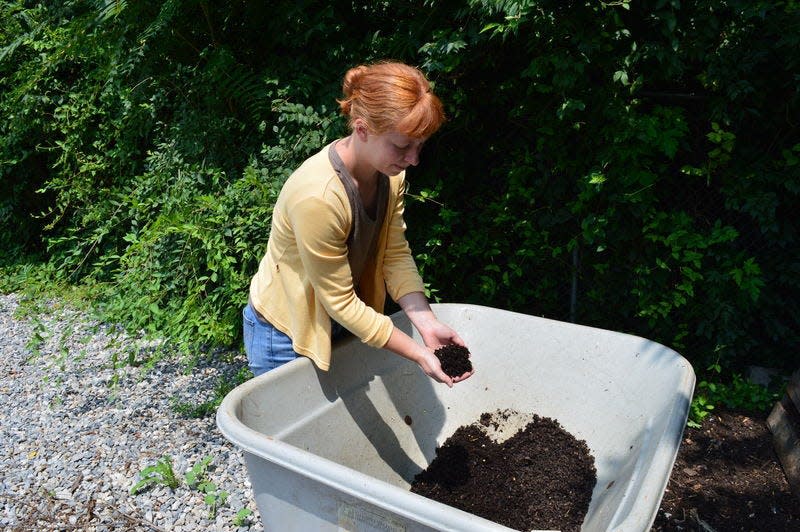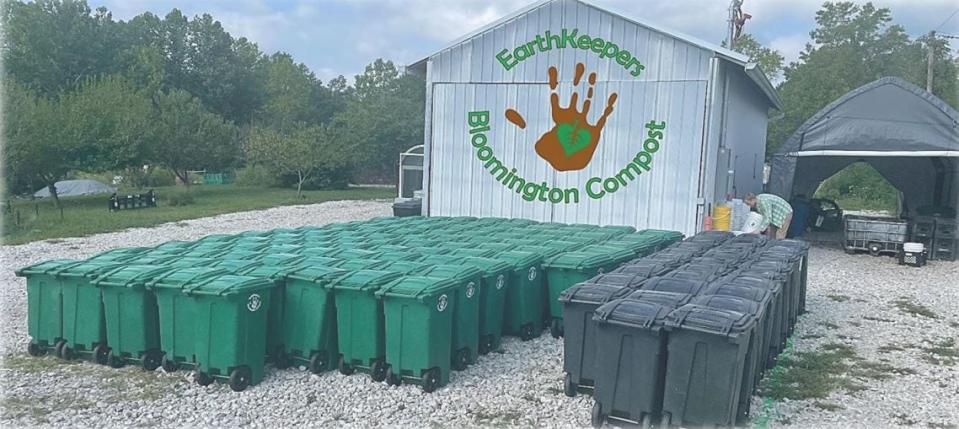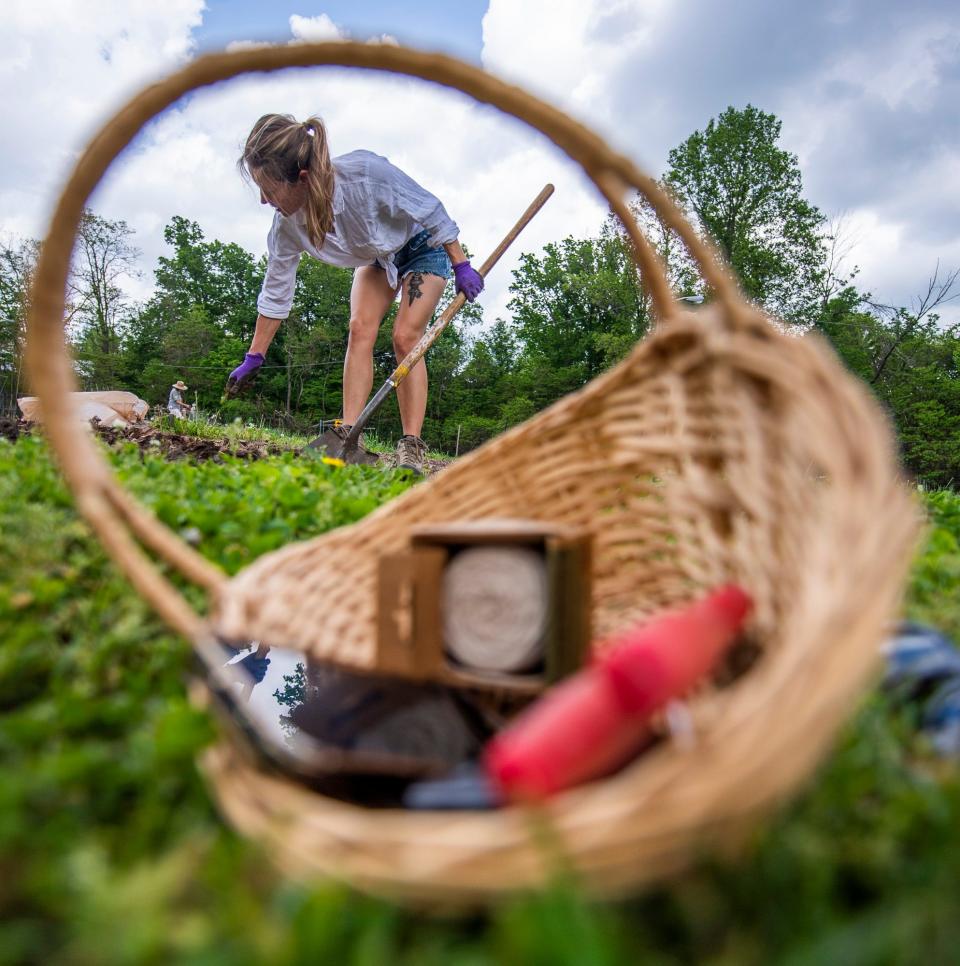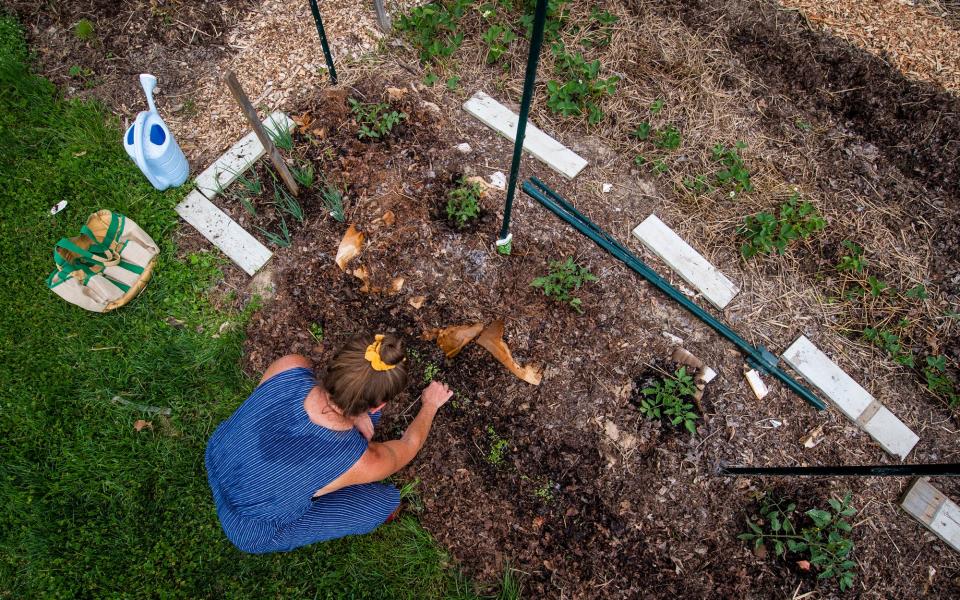Monroe County's sole commercial composter, EarthKeepers, shuts down
Editor's note: This story has been modified to clarify the list of appropriate items for home composting.
Starting this month, tons of organic waste — from half-eaten school lunches at Bloomington High School North to the annual leftovers of Cook employees' "Cooksgiving" — will no longer be recycled into nutrient-rich soil. At least not by Bloomington-based company EarthKeepers.
The Monroe County business, which has been providing a way for residents to get rid of their food waste through community composting for several years, officially ceased operations on May 31.

"The reality is that in the entire county, there isn't another facility that is legally allowed to take organic waste. We're the only facility. We're shutting down, so there is no place for anyone to take food waste at this moment," said Andrea Conway, co-owner of EarthKeepers.
By Conway's estimate, thousands of residents now have just two choices: send their organic materials to the landfill or compost on their own. Here's why that's a problem and what you can do:
Close to nature: How do you join a community garden in Bloomington?
What is composting? Why should people do it?
Composting is a natural recycling process where organic matter, such as leaves and food scraps, is turned into a valuable fertilizer that enriches the soil. Rather than throwing away moldy stalks of broccoli or ignoring piles of leaves, people can collect that waste in a pile and allow natural degradation to occur.
On average, Americans throw out 20 pounds of food per person every month. A recent waste composition study found nearly 40% of the waste stream in Monroe County is potentially compostable, 26.5% of which is food waste. Composting is a way to help the environment by enriching local soil and reducing greenhouse gas emissions.
How do people compost in Bloomington, Monroe County?
While anyone can compost if they have some yard space and a suitable bin, residents of Monroe County also have had the option to use a pick-up or drop-off composting service by EarthKeepers.
Check your soil: Watch out for jumping worms! They are bad for the soil, your garden and the environment
EarthKeepers was the passion project of Andrea and Ryan Conway, who also own and operate Fable Farms. The Conways have been part of the community composting initiative since 2018, becoming interested when they needed composted soil.
"We felt like we hit on this magic moment where we were starting to meet the need that we had personally for our farm, but then also to meet the needs of the farmers that had helped us out with all that advice, and to tackle this huge issue in the waste stream in the county," Ryan described.
Early in the process, the Conways collaborated with another organization, Green Camino, to provide composting service to residents. Shortly after, Green Camino was absorbed into Fable Farms, where the composting service was renamed EarthKeepers.
Until May 31, the composting service was offered in two ways: either a member of EarthKeepers would pick the organic waste up from a household's curb or the client could drop off their compostable items at one of nine drop-off locations around the county. That organic matter would then be delivered to Fable Farms or a partnering site, which were certified to compost such large quantities. Composted soil was later sold to other farmers and gardeners.
How many residents are losing composting service?
In addition to individual households, several businesses contracted with EarthKeepers to compost their organic waste, including Cook Medical Group, Monroe County Community School Corp. and dozens of local restaurants. Andrea and Ryan estimate they served thousands of people in the community through composting.
Since 2020, EarthKeepers has diverted 711 tons of organic waste from Monroe County, preventing 178 tons of methane emissions from landfills. Those emissions account for about 4,031 metric tons of carbon dioxide, the equivalent of burning 453,618 gallons of gasoline.
While it took some initial outreach and education, the composting service's popularity doubled in size with each year, with Andrea noting that they added around three dozen commercial kitchens within the past year. In 2022 alone, EarthKeepers collected 411 tons of organic waste.
But it wasn't enough to keep going.

Why is EarthKeepers closing its community composting service?
"It's a math game," Ryan said. "And that math started ending in subtractions."
While the business was sustaining itself, Ryan and Andrea noted they never personally made a considerable profit. That didn't pose a problem in the beginning, as this was a passion. However, the recent slumping economy and rising inflation made it harder for the business to sustain itself.
Since they began adding more restaurants to their clientele, thanks in part to a recent partnership with the city, contamination became much more of an issue. Only specific materials can be composted; for example, plastic does not decompose. Because a commercial kitchen typically has high turnover, the knowledge of what is and is not compostable leaves along with the rotating restaurant staff. Even with re-education efforts, there was a domino effort, leading to more labor hours by EarthKeepers dedicated to sifting through the waste to ensure no non-compostable material made its way into the soil.
On top of that, a site they had used to help bear the composting load closed unexpectedly earlier this year. Initial plans to buy more property were halted by Monroe County's rezoning plans, which limits where large-scale composting can be conducted.
So, with less space, a rising client pool and climbing costs, the Conways decided it was time to call it quits.

When is community composting service coming back to Bloomington?
Bloomington residents may not have to wait long for a substitute. City government personnel are actively looking for a way to bring the service back.
Assistant Director for Sustainability Shawn Miya said the city has identified a new composting service provider, based in Indianapolis, that could potentially expand into Bloomington. In addition to providing residential services such as curbside pick-up and drop-off sites, this provider would also connect with commercial kitchens much like EarthKeepers did. Early talks with the service provider will begin in the coming weeks.
Additionally, the Bloomington Commission on Sustainability is currently drafting a way for neighborhoods to implement smaller hubs of community composting. Groups would have to submit an online application for a city grant, which would buy the necessary tools and bins to be placed in a communal local area.
Miya said the city hopes to offer both of these services by the end of the year.
Can I compost at home?
In the meantime, people can learn how to set up and maintain an at-home composting system. The Monroe County Solid Waste Management District will host a free "Composting 101" workshop from 9 to 11:30 a.m. June 10.

Elisa Pokral, community outreach coordinator with the Monroe County Solid Waste Management District, will go over the basics on how to get started with just a little yard space and a compost container.
"You don't have to overanalyze it. You just throw it in there, and you wait to let nature take its course," Pokral describes. "Nature knows what to do with it."
Composting can be done year-round and is not a big time commitment, Pokral said. Once you make it part of your routine and work out just what can and cannot go into your bin, it's as easy as using a regular trash or recycling container. You can also use your enhanced soil for gardening.
Once you set it up, you will start seeing a difference within three to four months, as your compost pile starts to shrink and be turned into rich, nutrient-dense soil.
You can register for the workshop by emailing Pokral at epokral@mcswmd.org or calling 812-349-2866/2020.

What can you compost?
You can compost the following materials:
Vegetables and fruit scraps
Dry leaves
Egg shells
Baking ingredients, herbs and spices
Most cooked and raw food
Coffee grounds, filters or tea bags (without staples)
Paper materials such as newspapers, napkins, towels, cups or tissues*
Pizza boxes and uncoated paper carryout containers*
Cotton balls
Houseplant trimmings and cut flowers
Hair
Pet food and fur
*Whether to add paper towels, napkins and tissues to home compost is dependent on what the item was used for. Generally if it was used to clean up compostable materials, then it's OK. Check material content before adding cups to home compost. Pizza boxes and newspaper should be shredded before being added to home compost.
While you can technically compost meat or fish, bones, pet waste, and cheese or dairy products, both Pokral and the United States Environmental Protection Agency advise against doing so in a personal, at-home system.
Reach Rachel Smith at rksmith@heraldt.com.
This article originally appeared on The Herald-Times: Bloomington, Monroe County composting service ends. What's next?

